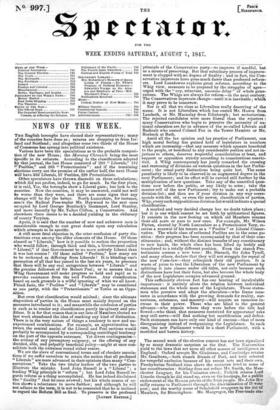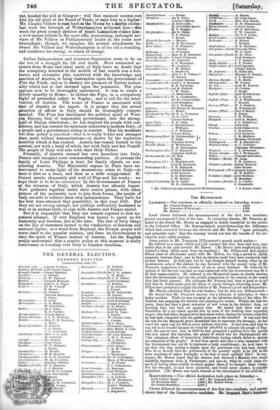The second week of the election contest has not been
signalized by so many dramatic surprises as the first. The Universities yield to the laws that act upon all other masses of intelligence in England: Oxford accepts Mr. Gladstone, and Cambridge retains Mr. Goulburn,—both stanch friends of Peel, and both selected for vengeful exclusion because of his recent acts and their own. Presbyterian Scotland rises above the sectarian level in some of her constituencies : Stirling does not refuse Mr. Smith, the Man- chester Leaguer, for his Unitarian creed ; Falkirk retains Lord Lincoln though he did stand up, even on the hustings, for a public endowment of the Roman priests of the Irish people. Mr. John Etc= milly returns to Parliament through the discrimination of D.von-. port ; and the worthy name of Scholefield reappears in the list of Members, for Birmingham. Mr. Macgregor, the Free-trade sta-
tilt, headed the poll at Glasgow : will that eminent success cost him his old place at the Board of Trade, or raise him to a higher ? Mr. Charles Villiers is sent back to the House by a eteuble choice : last week the borough of Wolverhampton reelected bim—this week the great county division of South Lancashire claims him ; a well-meant tribute to the most able, persevering, unbought ser- vices of Mr. Villiers as Parliamentary leader in the cause now triumphant ; though, we imagine, the mutual attachment be- tween Mr. Villiers and Wolverhampton is of too old a standing, and continues too strong, to admit of change.



























 Previous page
Previous page